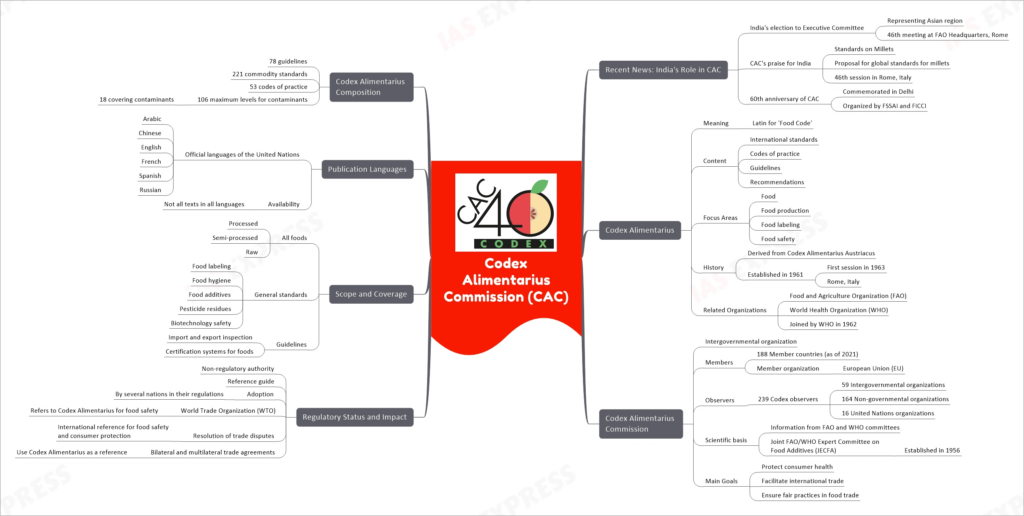Codex Alimentarius Commission (CAC)
Introduction
In a recent development, India has played a notable role in the Codex Alimentarius Commission (CAC). India’s active participation and contributions to CAC’s initiatives highlight the nation’s growing influence in the global food regulatory landscape. Noteworthy events include India’s election to the Executive Committee, CAC’s recognition of India’s standards on millets, and the commemoration of CAC’s 60th anniversary in Delhi.
Codex Alimentarius
Meaning
The term “Codex Alimentarius” originates from Latin, translating to the ‘Food Code.’ It represents a comprehensive set of international standards, codes of practice, guidelines, and recommendations relating to various aspects of the food industry.
Content
Codex Alimentarius encompasses a wide range of content, including:
- International standards
- Codes of practice
- Guidelines
- Recommendations
Focus Areas
The primary focus areas of Codex Alimentarius include:
- Food
- Food production
- Food labeling
- Food safety
History
The roots of Codex Alimentarius can be traced back to the Codex Alimentarius Austriacus. It was officially established in 1961, with its inaugural session taking place in 1963 in Rome, Italy.
Related Organizations
Codex Alimentarius Commission collaborates closely with various international bodies, including:
- Food and Agriculture Organization (FAO)
- World Health Organization (WHO)
- WHO joined the Codex Alimentarius Commission in 1962, reinforcing its global significance.
Commission’s Main Goals
The Codex Alimentarius Commission operates with several primary objectives:
- Protecting consumer health
- Facilitating international trade
- Ensuring fair practices in food trade
Codex Alimentarius Commission
The Codex Alimentarius Commission functions as an intergovernmental organization with a broad membership base.
Members
As of 2021, the commission comprises 188 member countries. Additionally, the European Union (EU) is recognized as a member organization.
Observers
The commission also welcomes observers from various sectors:
- 239 Codex observers
- 59 Intergovernmental organizations
- 164 Non-governmental organizations
- 16 United Nations organizations
Scientific Basis
The scientific foundation of the Codex Alimentarius Commission is built upon information derived from FAO and WHO committees. One notable committee is the Joint FAO/WHO Expert Committee on Food Additives (JECFA), established in 1956.
Regulatory Status and Impact
Despite being a non-regulatory authority, the Codex Alimentarius Commission wields considerable influence in the realm of international food standards and safety.
- It serves as a reference guide, often adopted by individual nations in their regulations.
- The World Trade Organization (WTO) looks to Codex Alimentarius for guidance on food safety matters.
- Codex Alimentarius serves as an international reference for resolving trade disputes and safeguarding consumer protection.
- Bilateral and multilateral trade agreements frequently reference Codex Alimentarius standards.
Scope and Coverage
Codex Alimentarius has a comprehensive scope, encompassing all types of foods, whether processed, semi-processed, or raw. It offers general standards and guidelines across various domains, including:
- Food labeling
- Food hygiene
- Food additives
- Pesticide residues
- Biotechnology safety
Additionally, Codex Alimentarius provides guidelines for import and export inspection and certification systems for foods.
Publication Languages
To ensure global accessibility, Codex Alimentarius materials are available in the official languages of the United Nations:
- Arabic
- Chinese
- English
- French
- Spanish
- Russian
However, not all texts are available in all languages, highlighting the complexity of the content.
Codex Alimentarius Composition
The Codex Alimentarius is a vast compilation of standards and guidelines, including:
- 78 guidelines
- 221 commodity standards
- 53 codes of practice
- 106 maximum levels for contaminants
- Covering 18 different types of contaminants
Conclusion
In conclusion, the Codex Alimentarius Commission, with its rich history and extensive reach, plays a pivotal role in shaping global food standards and safety regulations. Its collaborative efforts with international organizations, diverse membership base, and comprehensive content make it an indispensable entity in the realm of food safety and trade. India’s recent involvement and contributions underscore the evolving dynamics of this influential commission, as it continues to safeguard consumer health and promote fair practices in the global food industry.
If you like this post, please share your feedback in the comments section below so that we will upload more posts like this.


